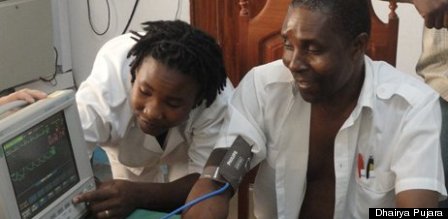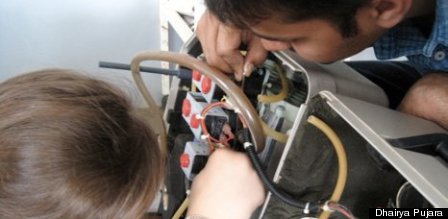This is my first blog post and the reason I chose to share this with you, is because this experience redefined me as a person and enhanced my purpose in more than one way.
My skills, my education and my sense of my own capabilities were challenged in this part of the world. Not only did I get a chance to be a part of the wonderful community at Chicuque Rural Hospital, Mozambique, Africa but also when I returned to Philadelphia from this journey, my self-reflection led me to work on my startup called Ycenter, which is about giving this experience to American university students to learn in non-formal settings by living and working with communities in Africa and India.
This blog post first appeared in an online magazine called Makeshift and I would like to re-share it from the source.

"Isso não funciona." "Nós não sabemos como usá-lo." "Os manuai stambé mestão em Inglês ou Espanhol." "This doesn't work." "We don't know how to use it." "The manuals are only in English or Spanish."
These complaints were the first words I heard from nurses and doctors at Chicuque Rural Hospital in Mozambique, echoing the sentiments of staff at other hospitals around the country. On my first day of work, I was given a tour of the facility, culminating in what would be my office -- a stuffy, storage room without a fan. The only furniture was a cabinet filled with incubators, defibrillators, and patient monitors, locked away unused. Most accessories -- batteries, disposable electrodes, and syringes -- were past their expiration and had to be trashed.
There's a myth that more equipment will improve healthcare in rural areas. But there's no lack of medical equipment here -- in fact quite the opposite. Hospitals often have hundreds of thousands of dollars of donated technology, sitting unused. Sometimes the equipment is abandoned due to a lack of critical components. An ultrasound has no gel. ECG monitors are missing electrodes to attach them to patients. There are digital blood pressure modules, but the cuffs leak. Or the electrical cord doesn't match Mozambique's wall sockets.

The underlying problem is a lack of training. Even if the equipment is operational, the staff hasn't been taught how to use the devices or what benefits they can provide. The monitoring equipment in the hospital, for example, can sound alarms when patients' vitals go out of acceptable range, enabling nurses to attend to many beds at once. Unaware of this functionality, nurses stand next to patients and monitor them manually -- an inefficient use of resources in a country with three doctors for every 100,000 people.
In some cases, the education system has fallen short completely, and the staff is missing knowledge of basic medical concepts. One team of nurses had been told that a healthy patient's blood pressure should be 160/100, a reading high enough to warrant putting a patient on blood pressure medication. Before I began repairing or installing equipment in this hospital, I had to begin in the classroom.
Tackling this problem proved difficult. The doctors and nurses only speak Portuguese, so I had to communicate through Miguel, the hospital's technician and electrical engineer. There's no PowerPoint, e-books, or Internet -- and some days, no electricity. I used a blackboard and chalk to teach the staff how to check blood oxygen levels and take heartbeat readings on the patient monitors. I left them with paper copies of my lecture notes, written in Portuguese via Google Translate.
The first class began with four staff members, including the director of nursing. The second had two additional doctors, and the class shortly grew to 15. Realizing that my time in Mozambique is limited, I'm moving towards peer-to-peer training, encouraging the doctors and nurses to teach each other rather than sitting in a classroom while I lecture -- enabling them to continue learning after I'm gone. "They don't teach us this way in the medical schools in Mozambique," said one doctor. "You really broke down the complex concepts into simple structure and made it fun to learn."
I came here as an engineer, expecting to fix broken medical equipment in the hospital. By the time I leave, I hope to have created a far more valuable tool: a self-perpetuating community of healthcare providers, capable of delivering great care despite the challenges of rural Mozambique.
Follow me on Twitter: @dhairyapujara
